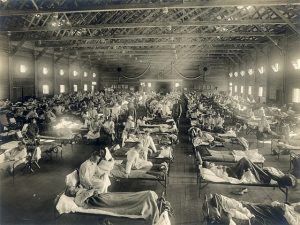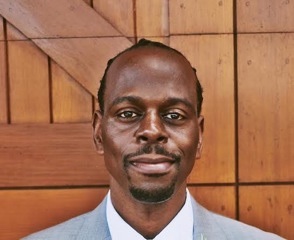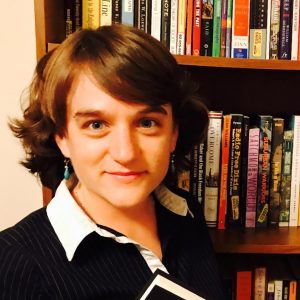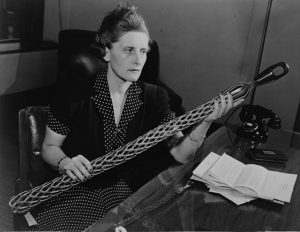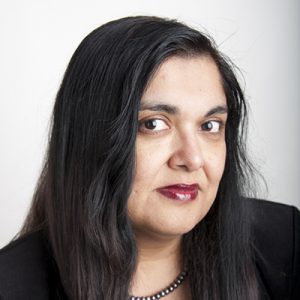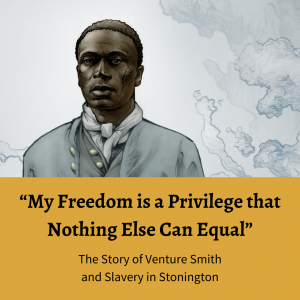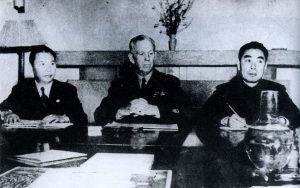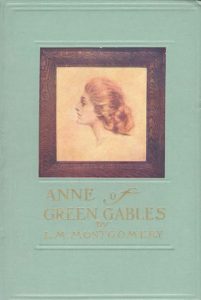How did you become involved in research on slavery in New England, and specifically the life of Venture Smith?
I first learned of Venture’s amazing life in the early 1990s while a graduate student in UConn’s Ph.D. program, taking a class on African-American history with Professor Donald Spivey. He had assigned Arne Bontemps book Five Black Lives, and I read Venture’s narrative as a part of that assignment. After I earned my Ph.D. at UConn, I continued to teach both at Storrs and at Avery Point, but I’ve taught only at Avery Point since about 2003. When I taught classes at UConn Avery Point, starting in 1996, I included Venture’s narrative as an assignment in US history classes and in a class on the history of the family. I love to use field trips for my classes, and I took my HIST 231 class (the current HIST 1501) to the Hempstead Houses in New London. As the students listened to the docent explain early American family cooking, I stepped back into the small “store” and saw a family genealogy for Joshua Hempstead and suddenly realized that one of my 4X great grandfathers was a grandson of Joshua Hempstead, a slaveowner who lived in New London.
I’m not much into genealogy, but I knew that another of Hempstead’s grandsons was Hempstead Minor, one of the whites who enslaved Venture for a short time. In 2005 I set out to research Venture’s life in Stonington, CT, starting with the land records to try to confirm the truth of Venture’s narrative. With the assistance of Elizabeth Hannan Kading, a graduate student in UConn’s History Department, we combed through thousands of deeds in the town hall deed books, reading literall7 thousands of deeds in cramped and sometimes nearly illegible 1th-century handwriting. We found two deeds – Venture’s purchase of 26 acres in 1770 and his sale of that same land in 1774. We then searched for the actual location of that land. Eventually we ran into a dead end. The owner of the land that had been Venture’s had lost the land in 1854 to The Washington Trust in a mortgage foreclosure – one of over 150 foreclosures that year. It was impossible to identify the land when the bank sold it.
Here serendipity entered the picture. Peg Stewart Van Patten, a fellow UConn employee at Avery Point, saw me one day when I was looking very discouraged and asked me what the problem was. I explained my dilemma, and she said that her grandparents had owned the land once owned by Venture as a part of a 400-acre farm in the Barn Island Area of Stonington, land that had been sold to the State of Connecticut in the 1960s. Eventually (it’s just too convoluted to go into detail) we located the plot of land that included a foundation of what had been Venture’s dwelling in the early 1770s! Ever since that discovery I have been adding to my research of Venture’s life and the African community in 18-century Stonington. In 2019 Liz and I received grant funding from the Stonington Historical Society to research Venture’s time in Stonington and the lives of other members of Stonington’s African and African-descended community. That research is the basis of the new permanent exhibit on Venture.
What were some of the most surprising findings?
One of the most surprising findings was that the records of people of color in Stonington were so challenging to tease out of the documents. In some cases, some people had sought to obscure the records by removing references to people of color – whitewashing the records, in effect. Another surprise was how legends of Venture had persisted in publications about Stonington into the early 20th century, making it a challenge to separate legends from the actual facts.
What were the challenges to this work?
The challenges to completing this work included the intense of amount of detailed research needed to tease out the evidence – reading every real estate deed over a fifty-year period, reading all the probate records, justice of the peace records, court records, diaries, merchants’ book accounts – all of the minutia needed to reconstruct the past while Liz and I were both working at other jobs. I was working as a full-time academic advisor at Avery Point while also teaching history as an adjunct, and Liz was working as an interpreter at Mystic Seaport. Our hours for research had to fit in when we could find the time.
What do you hope that patrons take away from this exhibition?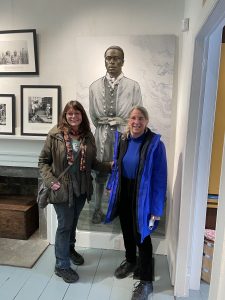
What I hope patrons take away from the exhibit is an understanding of the integral place the Africans and their descendants had in colonial and early national Connecticut. When Liz and I stood by the sign in the Barn Island Reserve, back in 2005, I said that someday I wanted Venture’s homesite to be on the Connecticut Freedom Trail so people could understand the contributions made by enslaved and formerly enslaved people to Connecticut’s development.
The exhibit makes it possible for people who can’t make the hike out into the woods to the site of Venture’s former home to visualize the life that Venture and other enslaved people in Connecticut had to endure. The lesson of Venture’s life is that formerly enslaved people could become successful members of society despite rampant racism and discrimination if he or she had a fair chance to make a living. Actually, I think that’s a lesson that still needs to be learned.
Nancy Hathaway Steenburg is currently an adjunct instructor in History at the University of Connecticut, Avery Point. She earned her A.B. in History at Radcliffe College, Harvard University and then went on to earn her Master’s in American History at Trinity College. She pursued her Ph.D. in United States History at the University of Connecticut. She has worked in higher education since returning to school at UConn in 1991 to complete her Ph.D. in history. She served as the Program Coordinator for Maritime Studies and American Studies at UConn’s Avery Point campus; she was the Director for the General Studies program at the Avery Point campus from 2007 to 2020, and the Associate Director for campus advising from 2013 to 2020. She was awarded the UConn Outstanding University Advising Award for 2018-2019.
Nancy has won several outstanding teaching awards. She teaches an array of courses that include Constitutional History of the U.S., Europe in the 20th Century, Social and Cultural History of Connecticut and New England, History of the Family, and History of Connecticut.
Outside of UConn, Nancy has served on numerous non-profit boards in the field of history, including serving as president of the Association for the Study of Connecticut History, president of the New London County Historical Society, and president of the Connecticut Coalition for History. She also served as book review editor and interim editor for Connecticut History Review, the only scholarly journal of Connecticut history.
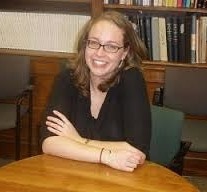 UConn History PhD ’15 Erin Bartram founded Contingent Magazine with this vision: to broaden who does history, how they do it, and where they do it. Bartram, who is a historian of the 19th century United States and currently works as the School Programs Coordinator at The Mark Twain House and Museum in Hartford, CT, is an example of how to do history outside of tenure-track positions. As a part of Contingent Magazine’s “Doing History” series, Erin Bartram reveals what energizes her about her work, from the variety of programming to K-12 curriculum design. Bartram describes that through her work in public history, she is able to use her research in gender and family histories of New England to tell richer stories about the past. In the article, Bartram affirms that:
UConn History PhD ’15 Erin Bartram founded Contingent Magazine with this vision: to broaden who does history, how they do it, and where they do it. Bartram, who is a historian of the 19th century United States and currently works as the School Programs Coordinator at The Mark Twain House and Museum in Hartford, CT, is an example of how to do history outside of tenure-track positions. As a part of Contingent Magazine’s “Doing History” series, Erin Bartram reveals what energizes her about her work, from the variety of programming to K-12 curriculum design. Bartram describes that through her work in public history, she is able to use her research in gender and family histories of New England to tell richer stories about the past. In the article, Bartram affirms that: